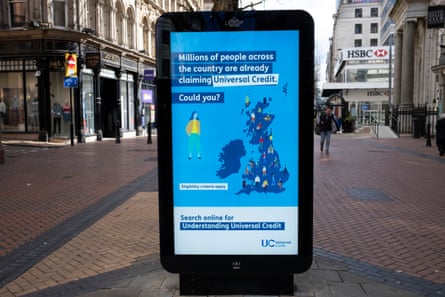Workers laid off due to the coronavirus crisis and applying for universal credit for the first time may be surprised to learn how little it pays and how difficult the process can be.
That was the stark warning from benefits experts this week as many people embark on their first ever benefits claim.
More than 1 million people have applied for universal credit in the past month. The result has been huge waits to talk to benefits staff on the phone. So if you are about to claim for the first time, how do you do it, and what can you expect?
How to claim
Anna Stevenson, a welfare and benefits specialist at the financial charity Turn2Us, says the first thing new claimants need to do is to assemble all their financial data, and then use a benefits calculator – there is one on the Turn2us website – which will give a good indication of the sum payable.
While people do not need a national insurance number to claim, details of rent and any outstanding earnings and mortgage costs will be required.
The biggest bar to many will be the fact that anyone with savings of £16,000 or more is not eligible to make a claim. They can only apply for jobseeker’s allowance (JSA) of £74.35 a week, and will receive no help with their rent.

All applicants are expected to file their claim online, or via the helpline. At the start, claimants must verify their identity – so have your passport or driving licence to hand.
One of the big stumbling blocks has been that large numbers of claimants have been unable to do this online, often because they moved house recently or because some of their documents do not match up. It has lead to reports of people spending many hours on hold. The Department for Work and Pensions (DWP) said this week it aimed to have a simpler ID system in place in the next few days.
Once over that hurdle, applicants must input details of any income they are yet to be paid, any savings they have, the income of other members of their household (spouse or partner plus any adult children), and their housing costs, such as rent or outstanding mortgage.
Problems can arise when trying to make an appointment to have the claim processed, says Stevenson. “Universal credit claimants have to make this appointment within 30 days of completing their applications and, for the claim to be approved, the interview must happen. Previously, this took place at the jobcentre but this is now being done over the phone. Again, people have been reporting that it is impossible to get through.”
The DWP accepts there have been long waiting times, and said on Thursday it was ending the need to call up. Instead, it said, its staff will be “proactively calling claimants if they need to check any of the information provided as part of the claim, as well as messaging them on their online journal to confirm details”.
What will I get?
It is difficult to generalise as each person’s calculation is based on their household income, how much rent they pay, number of children etc – see the scenarios below.
However, a single person over 25 will receive £410 a month, or about £94 a week basic benefit, provided they have no other income.
An unemployed couple on universal credit will receive £594 a month. If they have two children they will be paid a further £516 a month, provided the first child was born before April 2017.
They will also receive help with their rent – formerly called housing benefit – although in many cases it will cover only 70-80% of what they pay their landlord.
Stevenson says this is because the maximum rent that is claimable payable is set locally, and varies according to the local housing allowance. That rate is set at the lower 30% of rents in each area of the UK.
Claimants are also entitled to help with their council tax, although again this will not always cover the full amount. This has to be claimed direct from your local council.
Can I get help with my mortgage?
This will come as a shock to many. If you are applying for universal credit and do not have any earnings, you can receive 2.61% of your outstanding mortgage made as a monthly payment, but this does not become payable until you have been claiming benefits and not earning for nine months.
Someone with an outstanding mortgage of £150,000 would receive £326 a month (2.61% of 150,000 divided by 12) after nine months. However, this is a loan that accrues interest and has to be paid back, either before or when the house is sold.
When will I get the payments, and can I get an advance?
Universal credit is paid monthly in arrears and there is a five- to six-week wait for the payments to start. Those needing money immediately can claim an interest-free loan called an Advance within the first month, three days after filing the claim.
Is there any other help available?
Local authorities can sometimes help bridge the gap between the sum offered by universal credit to pay rent and the actual rent paid, known as discretionary housing payments. There is a limited amount of money available, so councils usually give preference to applications showing the greatest need.
Turn2Us says claimants could also be eligible for support from almost 2,000 charitable funds that offer grants to help people struggling to get by. The website will signpost people towards this help, or you can call its helpline on 0808 802 2000.
My income has dropped dramatically but I still have some work, can I apply too?
Yes. Dan Rust, a benefits expert at Turquoise Training, says universal credit is also there to help workers whose hours and income have been reduced as a result of a partial shutdown.
“If you are getting statutory sick pay because you are self-isolating, or if you are doing fewer hours at work, you should claim universal credit to top up your income,” he says.
I am (was) self-employed, can I apply?
Yes, and you should, even if you expect help to come from the government’s self-employed scheme. The government has also removed the floor on earnings that it previously used to limit payouts to those earning below the minimum wage from their self-employment.

How much can claimants expect to get?
Family with both parents working, but one has lost income
A manager is laid off after the owner shut his restaurant. He is 35 and married to a nurse who earns £24,000 a year. They have two children, aged nine and seven, and a £600-per-month mortgage. They have savings of £8,000.
The nurse will still receive her net pay of £1,663, while he will get universal credit payments of £351 per month, or £81 a week. But any help with the mortgage will come only after nine months of not working.
Self-employed freelance worker, lost nearly all earnings
A freelance (self-employed) camera operator who used to make films at Pinewood Studios still receives £150 a month in royalties, but all other work has dried up. He lives alone in a rented two-bedroom house in St Albans, for which he pays £1,400 a month.
He will receive only £798 towards his housing costs and a total universal credit payment of £1,058 per month. But this leaves him with a total income significantly less than his rent.
Self-employed consultant, 55, lost all earnings but has savings
A self-employed management consultant now has no work. He has paid off his mortgage and he and his wife have Isa savings of £60,000.
Unfortunately, he is not entitled to any help. Their savings are too high to apply for universal credit, and he is not eligible for JSA, because he is self-employed. Had he been an employee, he would have got £74.35 a week JSA.
Single person, 22, lost pub job and has moved back in with parents
This person had a short-term contract but has been laid off from his job in a pub, and has no income. He does not pay rent to his parents, so will receive the basic £343 a month.
Laid-off mobile phone salesman whose wife works at a supermarket
He has no work, while she earns £1,100 a month net. They have three children aged six, nine and 11. They pay rent of £1,500 a month in Manchester.
They will receive only £723 a month towards their rent, meaning he will receive a total universal credit payment of £1,561 per month, a little over their rent commitments.
An estate agent who used to earn £50,000
He has been laid off. His partner earns £40,000 gross in sales and is still being paid 100% by her employer. She has £20,000 in savings; he has £1,000. Their mortgage is £1,100 a month.
Again, he is not eligible for universal credit as their joint savings are too high. With two years of NI contributions, all he can claim is the new-style JSA of £74.35 per week, for 26 weeks. Once their savings fall below £16,000 he can claim universal credit.
Single person over 25 who lives in a shared flat in east London.
He has been laid off so there is no income. He pays £450 a month in rent, inclusive of all bills and council tax, for his flatshare. He has savings of £2,000, which is dwindling fast.
He will be eligible for the shared accommodation rate for housing costs, which is up to £591 per month, and in total will receive £860 per month.
Figures supplied by Dan Rust, a benefits expert at Turquoise Training. Figures are rounded to nearest £1 and do not include council tax support, which differs around the country.
